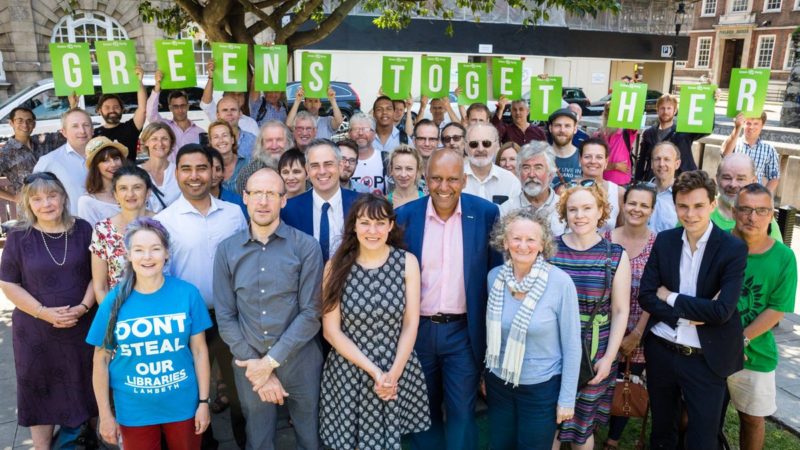Caroline Russell has been the only non-Labour councillor in Islington for the last four years. Josh Dell reports on the need for electoral reform.

For the past four years, Green party councillor and London assembly member Caroline Russell has had an unenviable task.
As one of Islington’s 48 councillors, she has battled tirelessly to help her constituents in her ward of Highbury East. She has presented alternatives to the policies put forward by Islington’s Labour majority. Yet in doing this, she has had to face an additional adversity few elected representatives would hope for: she is Islington’s sole opposition councillor.
Russell, who will this year fight for re-election in a ward that sits within Jeremy Corbyn’s constituency of Islington North, feels that she has had to make the best out of a situation that can be immensely lonely.
“I’ve created community colleagues instead of elected colleagues” she explains during a break from canvassing, noting that she sees one of the biggest parts of her work as providing Islington with an alternative town hall voice to the Labour behemoth.
In full council meetings, for example, she ensures that she prepares a speech for every item on the agenda in order for an alternative perspective to be put forward.
Russell is unequivocal when it comes to the question of whether such a large number of councillors has made the council complacent:
“That kind of supermajority leads to complacency. They don’t need to listen to people because they know they can get anything through that they need to.”
Supermajorities like Labour’s in Islington are common across English councils, most notably in London. Regardless of the quality of a council, the reality is that the use of First Past The Post (FPTP) in council elections leaves many voters’ views unrepresented.
For most voting in local elections, their vote translates into little to no representation for their chosen party. This evidenced in a range of local results from the last time London’s boroughs went to the polls in 2014.
In Islington in 2014, despite 46.3% of the electorate voting for a party that wasn’t Labour, Labour nonetheless secured 98% of the seats.
Down south in Lambeth, Labour managed to secure 93.7% of the seats with 49.7% of the vote, leaving their 59 councillors with an opposition consisting of three Conservatives, and one Green.
Further east in Newham, where 34% of voters went for a party other than Labour, Labour managed to go all the way and secure 100% of seats available.
Richard Watts, leader of Islington council, when asked by Left Foot Forward whether he and the Labour group were in favour of reforming the voting system for local elections, bypassed the question, saying:
“How elections are run is a matter for central government”, adding “but Islington Labour has topped the polls in every election in the borough, whatever the format, for the last 8 years.”
Although the chances of voting reform in local English elections are minimal, there are signs in London that the tide is beginning to turn. In Newham, Rokhsana Fiaz recently defeated 23-year incumbent mayor Sir Robin Wales in a primary contest in which a significant part of her platform was making local governance more accountable in light of Labour’s complete and utter dominance in the borough. She has promised to establish a ‘democracy, citizenship, and participation commission’ if elected.
Russell won Highbury East by eight votes in 2014, at a time when the Greens were polling significantly higher and local MP Jeremy Corbyn was a backbencher know by relatively few. If she secures re-election on May 3rd and finds herself in the same position as before, her aim is work with Labour to make the council more accountable and transparent, including ensuring that all full council meetings are livecast online.
Regardless of whether Russell is elected or not, the absurdities of the situation were starkly put in the statement placed on the front of her most recent campaign leaflet distributed around Highbury East: “YOUR VOTE IS THE MOST IMPORTANT IN ISLINGTON”.
One can only wonder how the residents of Islington feel about their votes being less important.
Josh is a writer and campaigner, currently working with Make Votes Matter and previously for Bite The Ballot.
To reach hundreds of thousands of new readers we need to grow our donor base substantially.
That's why in 2024, we are seeking to generate 150 additional regular donors to support Left Foot Forward's work.
We still need another 117 people to donate to hit the target. You can help. Donate today.



